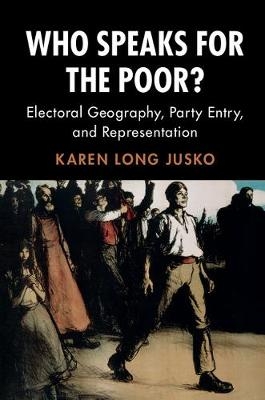
Who Speaks for the Poor?
Cambridge University Press (Verlag)
978-1-108-41988-8 (ISBN)
Who Speaks for the Poor? explains why parties represent some groups and not others. This book focuses attention on the electoral geography of income, and how it has changed over time, to account for cross-national differences in the political and partisan representation of low-income voters. Jusko develops a general theory of new party formation that shows how changes in the geographic distribution of groups across electoral districts create opportunities for new parties to enter elections, especially where changes favor groups previously excluded from local partisan networks. Empirical evidence is drawn first from a broadly comparative analysis of all new party entry and then from a series of historical case studies, each focusing on the strategic entry incentives of new low-income peoples' parties. Jusko offers a new explanation for the absence of a low-income people's party in the USA and a more general account of political inequality in contemporary democratic societies.
Karen Long Jusko is Assistant Professor of Political Science at Stanford University, California, and an affiliate of the Europe Center and the Center for the Study of Poverty and Inequality. She received her Ph.D. from the University of Michigan and was a Fellow at the Center for the Study Democratic Politics at Princeton University and a National Hoover Fellow. Jusko has received research support from the National Science Foundation as part of a European Science Foundation Collaborative Research Program. Who Speaks for the Poor? builds on graduate research that received the Harold D. Laswell Prize for the best dissertation in the field of public policy from the Policy Studies Organization and the American Political Science Association Public Policy Organized Section.
1. Who speaks for the poor?; 2. How electoral geography matters; 3. New parties and the changing electoral geography of contemporary democracies, 1880–2000; 4. The populists and 'third-party men' in America; 5. Canadian electoral geography and the strategic entry of the CCF and social credit; 6. The implications of electoral geography for British Labour; 7. The Swedish Social Democratic Party, and the long-term implications of electoral reform; 8. 'It didn't happen here': the general implications of electoral geography for the political representation of the poor.
| Erscheinungsdatum | 04.11.2017 |
|---|---|
| Reihe/Serie | Cambridge Studies in Comparative Politics |
| Zusatzinfo | Worked examples or Exercises |
| Verlagsort | Cambridge |
| Sprache | englisch |
| Maße | 158 x 235 mm |
| Gewicht | 440 g |
| Themenwelt | Sozialwissenschaften ► Politik / Verwaltung ► Staat / Verwaltung |
| ISBN-10 | 1-108-41988-7 / 1108419887 |
| ISBN-13 | 978-1-108-41988-8 / 9781108419888 |
| Zustand | Neuware |
| Haben Sie eine Frage zum Produkt? |
aus dem Bereich


